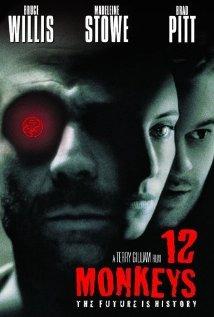
“Solving the riddle of 12 Monkeys is an exhilarating challenge,” says Peter Travers of Rolling Stone. Terry Gilliam (Time Bandits, The Fisher King, The Adventures of Baron Munchausen, Fear and Loathing in Las Vegas, and The Man Who Killed Don Quixote… well, not quite) has created an apocalyptic puzzle that dismembers time, like a surgeon performing an autopsy, so that we can explore what makes science tick–the science that unravels how the mind works, how the world goes, and how the heart sings. When Cole (Bruce Willis) the time-traveler meets Goines (Brad Pitt) the fingernail-chewing son of a famous virologist, Goines opines, “The problem with science is… it’s not an exact science.”
Cole comes to the past (1996) from the present (2035) with the knowledge that 5 billion people have been extinguished and the surface of the earth rendered uninhabitable by a deadly virus that has been unleashed upon humanity. Cole is a criminal who survived the holocaust because he was isolated in prison, and he is given a mission that may earn him his freedom if successful–he is to return to 1996, find the deadly virus, and bring a sample back to the present (the future) so that it can be analyzed.
Time travel is much more than a clever device in this story–it is a way of tilting our vision of time so that we can think about the role of knowledge and power… of inevitability. Have the survivors, now in control of the ruins of civilization learned anything from the holocaust, or is the cold clinical reality rather that time plus knowledge has not changed them at all? Is knowledge being used as power to make certain the outcomes of history?
Cole, like Cassandra in Greek legend, knows what will happen, yet he is powerless to convince anyone that what he knows is true. Cole is surrounded by those who would use their knowledge to control the future. Psychologist Kathryn Railly (Madeleine Stowe), whose relationship with Cole moves from clinical detachment to loving compassion, eventually questions the science behind her psychological expertise: “I mean, psychiatry: it’s the latest religion. We decide what’s right and wrong. We decide who’s crazy or not. I’m in trouble here. I’m losing my faith.”
Cole speaks like a seer. He knows the future and he hears voices of those who share his knowledge. He is a prophet, yet he is not a messiah. He searches for the secret cult, the 12 Monkeys, the true believers who know that his vision of the future is true. So, what are the 12 Monkeys? Is the symbol used by the group, 12 monkeys arranged in a circle, meant to resemble a clock–time, inevitability, the future, the past. Is the number 12 a prophetic apocalyptic icon? Are the monkeys baring their teeth in mock laughter as if to ask us which side of the cage bars we are on–are we really free… or in the grand evolutionary scheme, have we really progressed all that far?
David Peoples (Unforgiven, Blade Runner) and his wife, Janet, worked from Chris Marker’s 1962 short film La JetTe, a classic piece of French avant-garde cinema, to create a screenplay filled with their own vision of a future haunted by the past. Terry Gilliam has created a haunting visual story filled with images and ideas that will linger in your mind and draw you back for a 2nd look, a 3rd look… Great films and great filmmakers have the power to do that.
-Steve Froehlich


